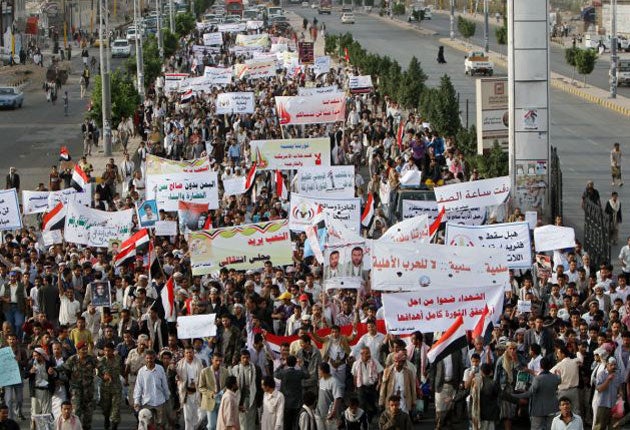Battles rage in al-Qa'ida-held Yemen town

At least 45 people were killed in an al-Qa'ida-held town in the latest violence in Yemen and protesters took to the streets of the capital today to demand that President Ali Abdullah Saleh stay in exile.
The army said it had killed 30 Islamist militants, including a local al-Qa'ida leader, in the southern town of Zinjibar. A local official said 15 soldiers had been killed in the battles for control of the town seized by militants about 10 days ago.
The fighting was another symptom of instability in Yemen, whose leader left for Saudi Arabia at the weekend for surgery on wounds suffered in an attack on his palace in Sanaa.
Demonstrators, who have been trying to topple Saleh for months, called a "million-man march" in Sanaa to pile pressure on him to stay away and hand over power permanently.
The volatile situation in Yemen, which lies on vital oil shipping lanes, alarms Western powers and neighbouring oil giant Saudi Arabia, who fear that chaos would enable the local al-Qa'ida franchise to operate more freely there.
They see Saleh's absence for medical treatment in Riyadh as an opportunity to ease the president out of office after nearly 33 years ruling the impoverished Arab nation.
"We are calling for a peaceful and orderly transition," US Secretary of State Hillary Clinton said yesterday.
Yemen's acting leader, Vice President Abu-Rabbu Mansour Hadi, said Saleh would return within days.
Saudi officials say it is up to Saleh whether he returns home or not, but they and their Western allies may want to revive a Gulf-brokered transition deal under which the Yemeni leader would quit in return for immunity from prosecution.
"Saleh's departure is probably permanent," said Robert Powell, Yemen analyst at the Economist Intelligence Unit.
"The Saudis, as well as the US and European Union, are pushing hard for him to stay in Saudi Arabia, as they view the prospect of his return as a catastrophe.
"Prior to his departure, the country was slipping inexorably into a civil war. However, his removal has suddenly opened a diplomatic window to restart the seemingly failed GCC-mediated proposal. It seems Saudi Arabia and other interested parties are unwilling to allow Saleh to derail it this time."
Saudi Arabia is worried by the activities of the Yemen-based al-Qa'ida in the Arabian Peninsula (AQAP), which has staged daring if not very effective attacks on Saudi and US targets.
Some of Saleh's opponents have accused the president of deliberately letting AQAP militants take over Zinjibar to demonstrate the security risks if he lost power.
The fighting has reduced Zinjibar, once home to more than 50,000 people, to a ghost town without power or running water.
Fighting also flared again in the city of Taiz, south of Sanaa, where anti-government gunmen have clashed sporadically with troops in the past few days.
A Saudi-brokered truce was holding in the capital after two weeks of fighting between Saleh's forces and tribesmen in which over 200 people were killed and thousands forced to flee.
Saleh has defied pressure to accept the transition plan brokered by the Saudi-led Gulf Cooperation Council (GCC). Three times, he has backed away from signing it at the last minute.
"The transition seems to be on track as per the GCC initiative. There will be many obstacles down the road, but without Saleh's destructive presence, we can overcome them," said Yemeni political analyst Abdul-Ghani al-Iryani.
Saleh, 69, was wounded on Friday when rockets struck his Sanaa palace, killing seven people and wounding senior officials and advisers in what his officials said was an assassination attempt. He is being treated in a Riyadh hospital.
The future of Yemen, where shifting alliances of tribal leaders, generals and politicians compete for power, is uncertain. Saleh's sons and relatives remain in the country, commanding elite military units and security agencies.
Other contenders in a possible power struggle include the well-armed Hashed tribal federation, breakaway military leaders, Islamists, leftists and an angry public seeking relief from crippling poverty, corruption and failing public services.
Youthful protesters have been celebrating Saleh's departure, but are wary of any attempt by the wily leader to return.
"In the near term, the biggest challenge is to set up a viable political reform process that has the general backing of the population, and allows Yemen to return to normal after months of unrest," the EIU's Powell said.
"In the medium term, Yemen's biggest challenge is economic - already the poorest country in the Middle East, it is running out of oil and water, and unless it can find alternative drivers of growth an economic collapse is entirely feasible," he said.
Join our commenting forum
Join thought-provoking conversations, follow other Independent readers and see their replies
Comments
Bookmark popover
Removed from bookmarks